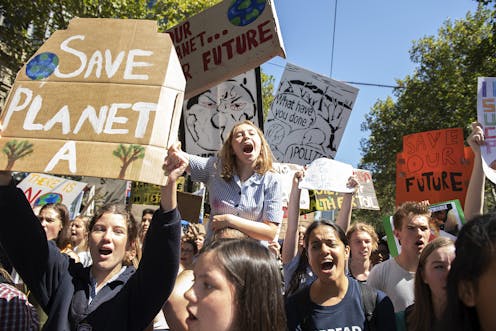Stop calling young people apathetic. For many, volunteering and activism go hand-in-hand
- Written by Lucas Walsh, Professor, Education Policy and Practice, Youth Studies in the Faculty of Education. Latest books with Rosalyn Black include "Imagining Youth Futures: University Students in Post-Truth Times" and "Rethinking Youth Citizenship a

Senator Jacqui Lambie has proposed establishing a Senate inquiry to increase the number of volunteers to address challenges such as climate emergencies.
One way she suggests doing this is by conscripting young Australians to national emergency service. The Senator argues that
today’s generation don’t really want to volunteer themselves and commit to certain things. They want to show up to a rally once a year and apparently that’s giving back … It bothers me that kids today wouldn’t know a bloody sandbag, let alone a spade.
Her proposal comes on the back of criticism of youth climate protesters by several prominent politicians, such as Resources Minister Matt Canavan, who has said
the best thing you’ll learn about going to a protest is how to join the dole queue.
Young people are already volunteering
Collectively, these statements reflect a view of young people that is wildly inaccurate.
Firstly, Lambie echoes a familiar but negative view of young people as disengaged, indifferent and immature.
Volunteering rates are indeed declining. In 2014, volunteering declined for the first time since 1995, when the ABS started conducting national voluntary work surveys. The proportion of people aged 18 years and over who were volunteering fell from a peak of 36% in 2010 to 31% in 2014. (This is the most recent data available).
Historically, younger people are less likely to engage in civic activities than older Australians. But wider research during the last decade suggests something more nuanced.
A national youth survey in 2018 found volunteering to be one of the top three activities for young people – ahead of arts, culture and music activities. ABS figures from 2014 also showed that while overall rates of volunteering were on the decline, young people aged 15-17 had the highest rate in the nation at 42%.
The measures used to track volunteering also fail to capture the breadth and depth of volunteering that takes place among young people.
The ABS has defined volunteering as
the provision of unpaid help willingly undertaken in the form of time, service or skills, to an organisation or group, excluding work done overseas.
For young people, many types of volunteering take place invisibly through online activities like constructing news groups on Facebook that contribute to a wider cause. Such online activities may not be for a particular organisation or group and may be conducted internationally.
In addition, the boundaries between personal and civic contributions are sometimes blurred. For example, volunteering in some culturally and linguistically diverse communities is just part of life, and not considered to be volunteering.
Similarly, research has shown that some young people don’t necessarily think of activities such as umpiring a local sporting event as volunteering, because for them it is just an interesting pursuit.
As a result, these contributions by young people sometimes go unrecognised.
Acknowledging that its definition does not account for informal volunteering like this and other activities such as activism, the ABS is now seeking to capture
a broader range of volunteering activity and characteristics.
Protesting is an equally valid way of giving back
Young people are also increasingly motivated to take part in another form of civic participation: peaceful protest. For many, protesting for important causes is considered an equally valid way to give back to society.
The most prominent example of this are the student climate strikes around the world that have been galvanised by youth activist Greta Thunberg. Thousands of Australians students are expected to walk out of their classes again on Friday.
Read more: Why don't more people volunteer? Misconceptions don't help
Jonas Kampus, a 17-year-old protester from Switzerland, described the importance of these efforts to the Guardian:
For people under 18 in most countries, the only democratic right we have is to demonstrate. We don’t have representation.
Canavan has a different view, saying that young people “don’t learn anything” from leaving school to protest.
But experiential learning through activism can be powerful and connect people to finding common solutions. Education isn’t just about securing future jobs, as Canavan has suggested. It’s also about developing inquisitive, creative and critical thinkers who fully participate in society.
Young people throughout the world are demonstrating these attributes and participating in ways that do not register in conventional measures. Many are actively engaging the challenges facing our society and are acutely aware of the value of education.
There is another important connection between protesting and volunteerism. One international study has found that
people involved in voluntary associations are up to five times more likely to make political demands than those without such membership.
University of the South Pacific researcher Jacob Mwathi Mati and his colleagues argue that activist movements can serve as “schools of democracy that teach civic skills and foster civic attitudes.” Taking part in climate change protests, for example, can build capacity for citizen engagement in the same way as more traditional forms of volunteering.
The great majority of politicians are hardworking and dedicated to making a difference in society, and painting them with broad-brush criticisms that reinforce negative stereotypes does not do them justice.
It’s equally unfair to reduce young people to passive and clueless individuals in need of compulsory volunteer conscription.
Authors: Lucas Walsh, Professor, Education Policy and Practice, Youth Studies in the Faculty of Education. Latest books with Rosalyn Black include "Imagining Youth Futures: University Students in Post-Truth Times" and "Rethinking Youth Citizenship after the Age of Entitlement", Monash University





